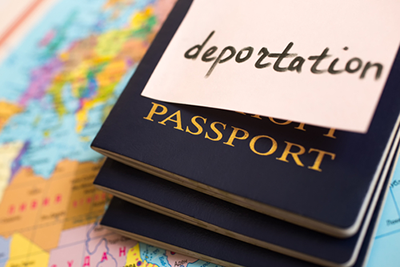When can a person come back to the United States after being deported?

One of the most common questions I hear in consultations or by email inquiries is a variation of, “I was deported. When can I come back to the United States?”
The short answer is, “It depends.” There no way to give an accurate answer regarding a specific case without seeing a person’s immigration file and talking to the person.
There are several different grounds of removal and inadmissibility that apply to non-United States citizens. When an immigration attorney is trying to determine whether someone can return to the United States, the attorney has to solve two problems:
- Is the person inadmissible to the United States?
- Is there a visa available for the person?
What makes a person inadmissible to the United States?
When a person is deported (removed) from the United States, he or she is inadmissible for a period of time. This time varies depending on the reason for removal. The shortest time period is five years. The longest period of inadmissibility is a permanent bar from returning to the United States. Without reading the Immigration Judge’s order, it is impossible to determine how long the person is barred from the United States.
In addition to the period of inadmissibility caused by the removal, the reason the person was deported may have its own ground of inadmissibility. For example, someone who has been in the United States without status for more than a year is deportable. If that person is deported, that person has two grounds of inadmissibility: 1) a five year bar for being removed from the United States and 2) a ten year bar for being unlawfully present in the United States for more than one year.
At a minimum, a person who has been deported must apply for advance permission to apply for a visa. The person may also need a waiver of inadmissibility, depending on the reason for deportation and how recently the deportation happened. All waivers are difficult to obtain. The government has a lot of discretion in granting a waiver.
Not all people are eligible for waivers. Applicants for nonimmigrant visas may apply for waivers. These waivers, however, have set expiration dates.
Applicants for immigrant visas must have a qualifying United States citizen or lawful permanent resident family member (spouse or parent) in order to apply for a waiver of inadmissibility.
What visas are available to someone who has been deported?
This is often the easier question to answer. Everyone who comes to the United States needs some sort of immigration document (typically a visa). In theory, someone who has been deported can apply for any type of visa. However, in practice, not all visas will be available for someone who has been deported. Most people who have been undocumented immigrants in the United States for extended time periods may find it very difficult to obtain most nonimmigrant visas.
Visas that have dual intent (nonimmigrant intent and immigrant intent) may be more viable, but those often require sponsorship by an employer.
Immigrant visas may be available, if the person has a United States citizen or lawful permanent resident family member or an employer who will sponsor lawful permanent residence.
Without a visa, the person cannot come back to the United States, even if a period of inadmissibility has expired.
Conclusion
In order to return to the United States after deportation, a person must be admissible to the United States or be able to obtain a waiver of inadmissibility and be able to obtain an appropriate visa. For an attorney to answer the question, “When can I come back?”, the attorney needs:
- To review the person’s entire immigration file to learn why the person was deported; and,
- To meet the family and any prospective employer to determine if there is an appropriate visa for the person.

